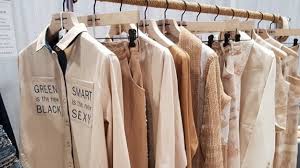Eco-Chic: Embracing Sustainable Clothes for a Greener Wardrobe
The Rise of Sustainable Clothing: A Fashion Revolution
In recent years, the fashion industry has undergone a significant transformation with the rise of sustainable clothing. As consumers become more aware of the environmental and ethical impact of fast fashion, there has been a growing demand for clothing that is produced in a way that is kinder to the planet and its people.
Sustainable clothing encompasses various practices aimed at reducing the environmental footprint of the fashion industry. This includes using eco-friendly materials such as organic cotton, bamboo, and recycled fabrics, as well as implementing ethical manufacturing processes that ensure fair wages and safe working conditions for garment workers.
One of the key benefits of sustainable clothing is its positive impact on the environment. By using natural and recycled materials, sustainable fashion reduces the reliance on harmful chemicals and minimises waste generation. Additionally, sustainable brands often prioritise local production to reduce carbon emissions associated with transportation.
Furthermore, sustainable clothing promotes a shift towards a circular economy where garments are designed to be durable, repairable, and recyclable. This approach not only extends the lifespan of clothing but also reduces the amount of textile waste ending up in landfills.
As consumers become more conscious about their purchasing decisions, many are turning to sustainable clothing brands that align with their values. These brands not only offer stylish and high-quality garments but also transparently communicate their sustainability practices to build trust with their customers.
In conclusion, sustainable clothing represents a positive step towards creating a more environmentally friendly and socially responsible fashion industry. By supporting sustainable brands and making informed choices as consumers, we can contribute to a more sustainable future for our planet while still looking stylish and feeling good about our wardrobe choices.
Understanding Sustainable Clothing: Key Questions and Answers for Conscious Consumers
- What is sustainable clothing and why is it important?
- How can I identify if a clothing brand is truly sustainable?
- What are the benefits of choosing sustainable clothes over fast fashion?
- Are sustainable clothes more expensive than traditional clothing?
- How can I contribute to promoting sustainability in the fashion industry through my clothing choices?
What is sustainable clothing and why is it important?
Sustainable clothing refers to garments that are produced using eco-friendly materials and ethical manufacturing practices, with a focus on reducing the environmental impact of the fashion industry. It is important because it addresses the harmful effects of fast fashion, such as excessive waste generation, pollution, and exploitation of garment workers. By opting for sustainable clothing, consumers can support brands that prioritise environmental conservation, promote fair labour practices, and contribute to a more sustainable and ethical fashion ecosystem. Making conscious choices about the clothes we wear can have a significant positive impact on both the planet and the people involved in the production process.
How can I identify if a clothing brand is truly sustainable?
When determining if a clothing brand is genuinely sustainable, there are several key factors to consider. Firstly, look for transparency in the brand’s practices, including information on their sourcing of materials, production processes, and ethical standards. Sustainable brands often provide details on their eco-friendly initiatives and certifications that validate their commitment to sustainability. Additionally, consider the materials used in their garments – organic cotton, recycled fabrics, and natural dyes are common indicators of a sustainable brand. Look for evidence of fair labour practices and supply chain transparency to ensure that the brand upholds ethical standards. By conducting thorough research and asking questions about a brand’s sustainability efforts, you can make informed choices that align with your values and support a more environmentally conscious fashion industry.
What are the benefits of choosing sustainable clothes over fast fashion?
When considering the benefits of choosing sustainable clothes over fast fashion, it becomes evident that the decision goes beyond mere style preferences. Opting for sustainable clothing offers a multitude of advantages, including reduced environmental impact through the use of eco-friendly materials and ethical manufacturing practices. By supporting sustainable brands, consumers contribute to a more responsible fashion industry that prioritises longevity, quality, and fair treatment of workers. Moreover, sustainable clothes often boast higher durability and timeless designs, leading to a more sustainable wardrobe in the long run. Making the switch to sustainable fashion not only aligns with ethical values but also promotes a more conscious and mindful approach to dressing that resonates with the growing awareness of environmental sustainability.
Are sustainable clothes more expensive than traditional clothing?
When considering sustainable clothing, a common question that arises is whether it is more expensive than traditional clothing. While it is true that sustainable garments may come with a higher price tag upfront, it is essential to understand the long-term value they offer. Sustainable clothing is often made from high-quality materials that are ethically sourced and produced, leading to greater durability and longevity. By investing in sustainable pieces, consumers not only contribute to positive environmental and social impacts but also benefit from well-made garments that stand the test of time, ultimately offering better value for money in the long run.
How can I contribute to promoting sustainability in the fashion industry through my clothing choices?
By making mindful clothing choices, you can play a crucial role in promoting sustainability within the fashion industry. Opting for sustainable clothing brands that use eco-friendly materials, ethical manufacturing practices, and transparent supply chains is a significant step towards reducing the environmental and social impact of your wardrobe. Additionally, extending the lifespan of your garments through proper care, repair, and upcycling can help minimise textile waste. By supporting sustainable fashion and advocating for responsible consumption habits, you can contribute to a more sustainable future for the fashion industry and our planet as a whole.

Leave a Reply